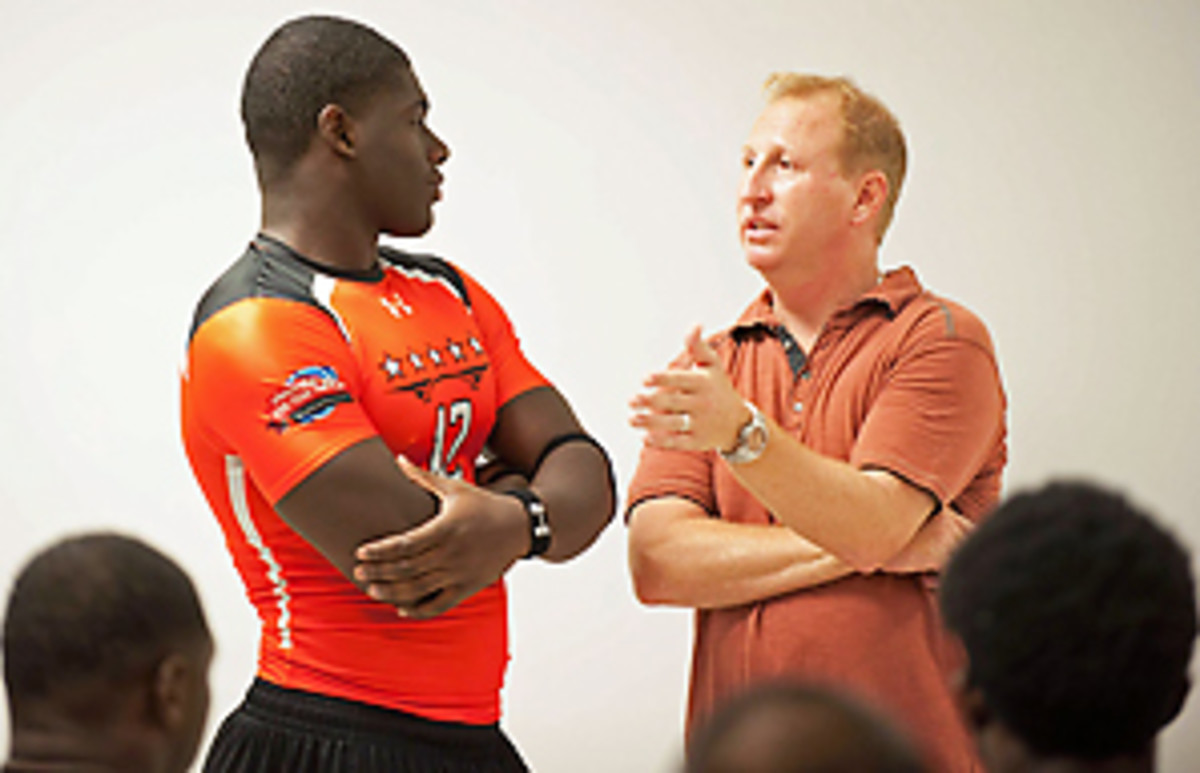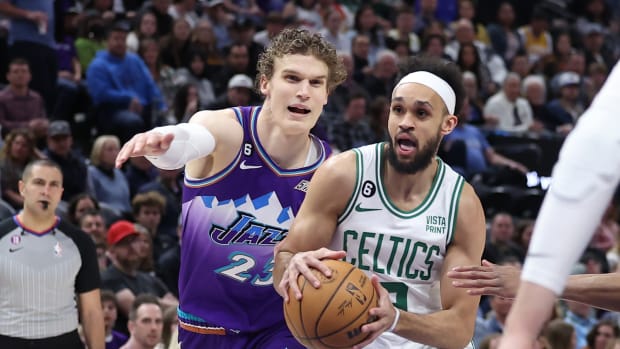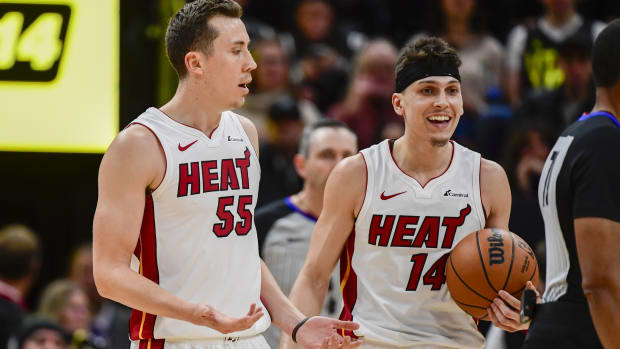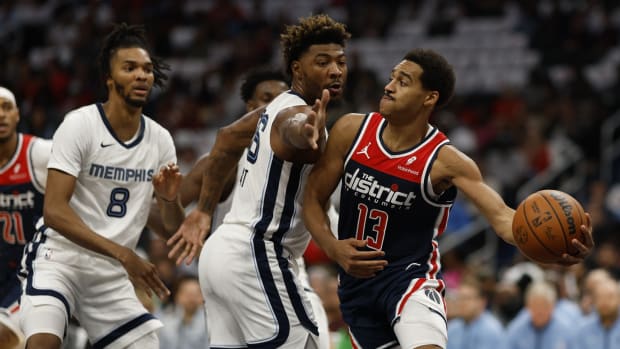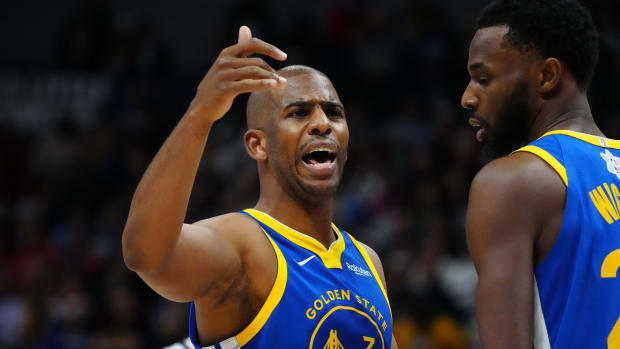Meet the man who will save us from the boring athlete interview
Shenbaum: "How old were you when you first met an alien?"
Mitchell: "I was two-and-half. I was swimming."
Mitchell, standing in front of several dozen of the nation's best players last month at the Rivals100 Five-Star Challenge, explained that an extraterrestrial being pulled him out of the ocean and saved him from drowning. Earlier, Mitchell had flashed a hand signal -- purportedly gleaned from his third-kind encounter -- that looked awfully similar to the Vulcan "Live long and prosper" gesture from Star Trek.
Shenbaum: "He got you out. What was that alien's name?"
Mitchell: "Robert."
It should be rather obvious by now that Mitchell hasn't met an alien. But for his interview with Shenbaum, Mitchell was an expert on aliens. Shenbaum was teaching Mitchell and the other players a game called "Expert Speaker." The rules are simple: The interview subject is an expert on whatever topic the audience chooses. Everything the subject says is correct and should be taken as gospel fact. Johnathan McCrary, a quarterback from Ellenwood, Ga., who has committed to Vanderbilt, saddled Mitchell with aliens as a topic.
Why would Shenbaum turn an otherwise normal star receiver into an expert on aliens? To teach him to speak with confidence.
Shenbaum is the man who will save us all from boring athlete interviews. "In sports, you hear so many cliché answers," said San Francisco 49ers quarterback Alex Smith, a Shenbaum client. "So many guys just regurgitate the same stuff."
Remember that scene from the otherwise average film Bedazzled? Dumb question. You probably don't. But Brendan Fraser's character gives an answer in a postgame interview that, while played for laughs, doesn't stray too far from some of the actual answers given by today's star athletes. "Well, you know, you go out there and you give 110 percent," Fraser says. "You want to play good, and, you know, you hope you play good. I think we played pretty good tonight."
If every athlete met Shenbaum when he was 17 years old, we might never hear another answer like that one. As an added bonus, the athletes would learn how to speak to team executives in pre-draft interviews in ways that would enhance their stock instead of send it plummeting. Also, heeding Shenbaum's teachings might someday save an athlete from a sneaker-in-mouth moment that could cost millions in endorsements and destroy hard-earned goodwill.
At the Five-Star Challenge, Shenbaum's course appeared on the schedule as "media training," but his classes reach far beyond handling questions from reporters. When Shenbaum started 15 years ago, he was an actor a few years from landing his biggest role -- band camp counselor in American Pie 2 -- who did media training on the side. Since, he has evolved into a full-fledged communication coach. Through his company, game on Nation, Shenbaum teaches athletes at all levels how to use body language, words and laughter to master interviews, pre-draft meetings, public appearances and negotiations. If those lessons also help Shenbaum's pupils on dates, even better.
For example, the Expert Speaker game is designed specifically to help athletes handle interviews, but it can be applied in almost any conversation. After Shenbaum finished interviewing Mitchell about aliens, Shenbaum explained that each of the players in attendance should feel like experts in every interview. Why? Because they are experts on the two subjects usually covered: football and themselves.
Shenbaum understands athletes -- especially younger ones -- don't necessarily dislike talking. Like anyone else suddenly thrust into the spotlight, they fear saying something stupid. "You're not bad communicators," Shenbaum told the players. "We're just afraid to talk." With exercises such as Expert Speaker and Red Light, Green Light -- a rapid-fire improv game that forces players to think quickly -- Shenbaum tries to instill an inner confidence that the players can't give the wrong answers when speaking about those two topics. "All that comes from is developing that muscle that's called social confidence," Shenbaum said. "That's it."
The games left the other players doubled over with laughter. In one Expert Speaker session, Crete, Ill., receiver Laquon Treadwell pretended to ride a tricycle around the room while attempting to recruit movie producers. This made perfect sense in the context of the game, and it had Treadwell's fellow players howling. Treadwell smiled, too, proving another of Shenbaum's main points. The athletes who make the world laugh with them will be more successful off the field than the ones who make the world laugh at them, or worse, at someone else. Shenbaum doesn't have many hard-and-fast rules, but he advises all his clients to avoid any sexual, religious or gender-related humor. While those topics may make millions for stand-up comedians and actors, Shenbaum contends they will not help an athlete who hopes to someday sign an endorsement deal.
So how does one become a communication coach to star athletes? Pretty much by accident. While majoring in drama at Northwestern, Shenbaum had to choose from three tracks. He wasn't serious enough for serious drama. He didn't have the voice for musical theater. But he did have an elastic face and a quick wit, so he gravitated toward the comedy track. That led to improvisational training, which eventually became the basis for many of the exercises Shenbaum uses with the athletes he trains. That exercise Alabama's mental coach used to teach Crimson Tide players how to identify when to lead and when to follow? He learned it working alongside Shenbaum.
Shenbaum first conceived of the idea for training athletes using drama techniques while working on a WGN show called Energy Express shortly after his 1992 graduation from Northwestern. The children's show frequently featured Chicago-area athletes as guests. Shenbaum noticed some of the athletes -- including Bulls star Scottie Pippen and Bears quarterback Jim Harbaugh -- seemed uncomfortable in the studio setting even though they had microphones thrust in their faces on a regular basis. "When the athletes would come on the show, immediately when they walked on the set, they were out of their element," Shenbaum said. "I noticed that these guys were nervous."
He didn't get a chance to put his ideas to work until 1997, when Northwestern classmate Kimberly Williams introduced Shenbaum to Pete Sampras. By that point, Sampras had played pro tennis for nine years and had already won the bulk of his titles. Still, Sampras, a notorious introvert, wanted to learn how to better handle interviews.
Shenbaum decided that the only way to help an athlete learn was to create a curriculum that mirrored a practice or a strength-training session. Just as a strength coach may declare that his athletes will work on biceps, triceps and chest and use only exercises that strengthen those muscles, Shenbaum might declare that his athletes will work on eye contact, non-verbal cues and self-confidence and use only exercises that strengthen those traits. "I knew I could not lecture to Pete," Shenbaum said. "I needed to put him through exercises no different than his strength coach. I knew an athlete would respond to exercise versus lecture."
Shenbaum's work with Sampras led to work with then-Laker Rick Fox. That opened up basketball, which eventually led to a new avenue for the business. In 2003, Carmelo Anthony's management team approached Shenbaum to seek help preparing the Syracuse one-and-done sensation for his pre-draft interviews in Chicago with NBA team executives. Instead of helping his client give interesting answers to enhance stories, Shenbaum would teach his client how to carry himself in a manner that would convince a team to invest millions of dollars in the client. Since, Shenbaum has helped future first-rounders in multiple sports prepare for the draft. Athletes Shenbaum has trained include Smith (the NFL's top pick in 2005), Pittsburgh Penguins center Sidney Crosby (the NHL's top pick in 2005) and Greg Oden, the No. 1 pick in the 2007 NBA draft.
Something Sampras told Shenbaum always stuck, and it eventually led Shenbaum to his favorite set of clients. After working with Shenbaum, Sampras said he wished he had received communication training earlier. Shenbaum wondered how he could reach the young Pete Samprases of the world. He found it a few years ago when he began working with IMG Academies in Bradenton, Fla. The multi-sport academies, which sprang from Nick Bollettieri's tennis school, allowed Shenbaum to teach young phenoms who either used his training when they broke into the pro ranks of their sport or used it to help them earn college scholarships.
Shenbaum has since left IMG Academies, but he still relishes working with high school athletes such as the blue-chippers Rivals assembled in Atlanta last month. He hopes some of the players he met will take the lessons to heart the way Sampras and Smith did. One of Shenbaum's proudest moments came when Sampras took the mic during a tribute to his career at Arthur Ashe Stadium during the 2003 U.S. Open. Sampras had initially been uncomfortable with the idea of the tribute, but he delivered a heartfelt speech that opened tear ducts throughout the stadium. This past February, Smith called Shenbaum seeking advice. Smith had to give a speech to accept the AP Coach of the Year Award on behalf of his boss, Harbaugh. Shenbaum told Smith to remember the lessons from the exercises: maintain eye contact, speak with confidence, be self-deprecating, laugh with -- not at. Later, Shenbaum watched from his Florida home as Smith nailed the speech. "He used humor. He was concise. He smiled," Shenbaum said. "He was self-deprecating. It was just great to see that play out." Said Smith: "With Steve, it's about getting comfortable being who you are in front of the camera and just trying to be yourself."
During a recent teleconference to promote a celebrity golf tournament, Smith once again showed off some of Shenbaum's training. Asked about his golf game, Smith drew laughs when he deadpanned "I just hope I don't hit anyone." So, after intense training of all his communication muscles, is Smith ready for the improve stage? "No. I wish," Smith said. "Steve's a funny guy. I'd hope some of it would have rubbed off on me, but it didn't."






























